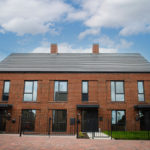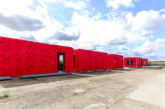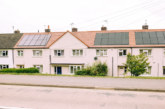A new Salford-based housing project boasts adapted construction methods to achieve affordable Passivhaus, at the same time as new research names Salford as an ‘energy crisis hotspot’.
Construction has completed on the first of five sites across Salford that will total 235 new homes to Passivhaus standard. The project, led by Seddon, turned what would have usually been multi-million-pound design techniques into affordable, scalable housing.
Salford City Mayor, Paul Dennett said: “It is fantastic news that these new affordable homes are being made to such a high energy-efficient standard. This is something that all developers should be aiming to do and it goes towards the aim of making Greater Manchester carbon free by 2038.”
Research published by Friends of the Earth identified ‘energy crisis hotspots’ across England and Wales, with Salford placed at number 68 of 332. Energy crisis hotspots are neighbourhoods where energy use is high and typical household income is below the national average. This is often due to poor insulation causing residents to use more energy to remain warm. According to the Department for Business, Energy & Industrial Strategy, 15.3% of Salford households are ‘fuel poor’, with average energy bills in the area set to increase in October from £2,187 to £3,198.
Paul continued: “We are in the middle of a cost-of-living crisis and on top of which we have the news that the energy cap is set to increase dramatically. This will force even more households into further poverty and put them under even more stress, wondering how they can make ends meet. It is a very difficult time for people to live through.
“Thankfully due to these homes being energy-efficient, it means the people who move into them will not have to spend as much money on their energy bills, which will be greatly welcomed. We need more homes like this in our great city.”
Passivhaus is a design standard used to create highly energy-efficient homes that maintain an almost constant temperature. Typically costing around 10% more to construct than a conventional home, Passivhaus has not always been a viable design option for affordable housing. The Brassington Avenue site saw Seddon adapt the standard rules of Passivhaus to build at a reduced budget, without compromising on energy efficiency.
Seddon Managing Director, Peter Jackson said: “We are passionate about helping our client tackle climate change and the energy crisis. Not only are we providing the city of Salford with affordable, low-energy housing, but we’ve also delivered an innovative approach to sustainable design that can be replicated across our whole country’s built environment.”
The method of design resulted in significant reductions in energy costs and almost eradicates fuel bills which are a cause for concern among 79% of adults in Britain today. The construction technique for the building fabric removes the need for a traditional heating system, instead using a single panel heater in the lounge in conjunction with the heat recovered from warm air extracted from kitchens and bathrooms, heat from light bulbs and appliances and heat generated by the occupants of the buildings themselves.
Peter continued: “Fuel poverty should be a key consideration to any efforts in achieving net zero. With the ongoing rise in energy bills, removing the need for traditional heating systems in affordable housing provides an ideal solution to helping those that need it the most.”
Other sites under this project include, Clifton Green and Ryall Avenue, both due to wrap in October 2022, as well as Kerrera Drive and Blandford Road.









